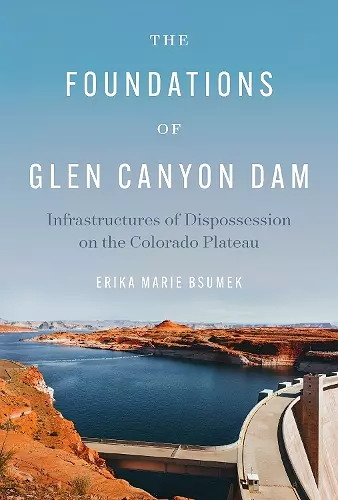The Foundations of Glen Canyon Dam
Infrastructures of Dispossession on the Colorado Plateau
Format:Hardback
Publisher:University of Texas Press
Published:2nd Jan '23
Should be back in stock very soon

2024 Best Indigenous Studies Award, The Mormon History Association
2024 Southwest Book of the Year, Pima County Public Library
A history of how the construction of the Glen Canyon Dam was built and sustained by social inequalities
The second highest concrete-arch dam in the United States, Glen Canyon Dam was built to control the flow of the Colorado River throughout the Western United States. Completed in 1966, the dam continues to serve as a water storage facility for residents, industries, and agricultural use across the American West. The dam also generates hydroelectric power for residents in Colorado, Wyoming, New Mexico, Utah, Nevada, Arizona, and Nebraska. More than a massive piece of physical infrastructure and an engineering feat, the dam exposes the cultural structures and complex regional power relations that relied on Indigenous knowledge and labor while simultaneously dispossessing the Indigenous communities of their land and resources across the Colorado Plateau.
Erika Marie Bsumek reorients the story of the dam to reveal a pattern of Indigenous erasure by weaving together the stories of religious settlers and Indigenous peoples, engineers and biologists, and politicians and spiritual leaders. Infrastructures of dispossession teach us that we cannot tell the stories of religious colonization, scientific exploration, regional engineering, environmental transformation, or political deal-making as disconnected from Indigenous history. This book is a provocative and essential piece of modern history, particularly as water in the West becomes increasingly scarce and fights over access to it continue to unfold.
[Bsumek] provides a fair, nuanced, and personal backstory of the megastructure. * Alcalde *
This is a useful corrective to the conventional view of infrastructure as massive public works projects . . . Most important, the humanity of her subjects shines through, and her territorial land acknowledgment for Glen Canyon Dam and Lake Powell is just and relevant. * H-Net Environment *
This is an important book. For historians of the West, it provides not just a model, but a challenge: to identify and explain colonialism and dispossession throughout the region’s past, even in places and times that might seem removed from such processes. This process may be uncomfortable, and it will probably be difficult; but Bsumek’s careful analysis of sources, actors, and perspectives has shown that it can—and should—be done. * Pacific Historical Review *
For newcomers to the history of the famous Glen Canyon Dam controversy, Erika Bsumek’s book is a good starting point; for others who already know a lot on this subject, the book is essential additional reading . . . It indelibly adds to existing writing, however, and should inform and affect all writings about western water yet to come. * Water Alternatives Book Review *
A masterful, powerful story...A necessary portrayal of human lives past, present, and future…Essential. * CHOICE *
The Foundations of Glen Canyon Dam thus offers an urgent update to existent scholarship by stressing how the dispossession of Native peoples—and their responses to it—dictated the dam’s future. * Journal of Arizona History *
The Foundations of Glen Canyon [Dam] is a thoughtful, well-argued, and useful book. It is an essential read for anyone interested in how settler colonialism in the American West is intertwined with religious ideologies, scientific knowledge, and state-sponsored expertise. It should find a welcome home in a range of upper division history courses and graduate seminars. The book also suggests some possibilities for future histories that might re-examine the engineered landscape through histories of dispossession. * Mormon Studies Review *
A bridge between canonical texts on western water history and recently written studies of Native American dispossession...[the book stresses] the importance of understanding the history of Native American dispossession, in part as a means of clarifying the choices for the future of the West. * Agricultural History *
The lived texture that Bsumek uncovers within these archives [of the Colorado Plateau's political, economic, and cultural matrix] helps readers understand cultural and spiritual practices as a coherent, shared social infrastructure. * H-Net SciMedTech *
ISBN: 9781477303818
Dimensions: 229mm x 152mm x 30mm
Weight: 626g
336 pages